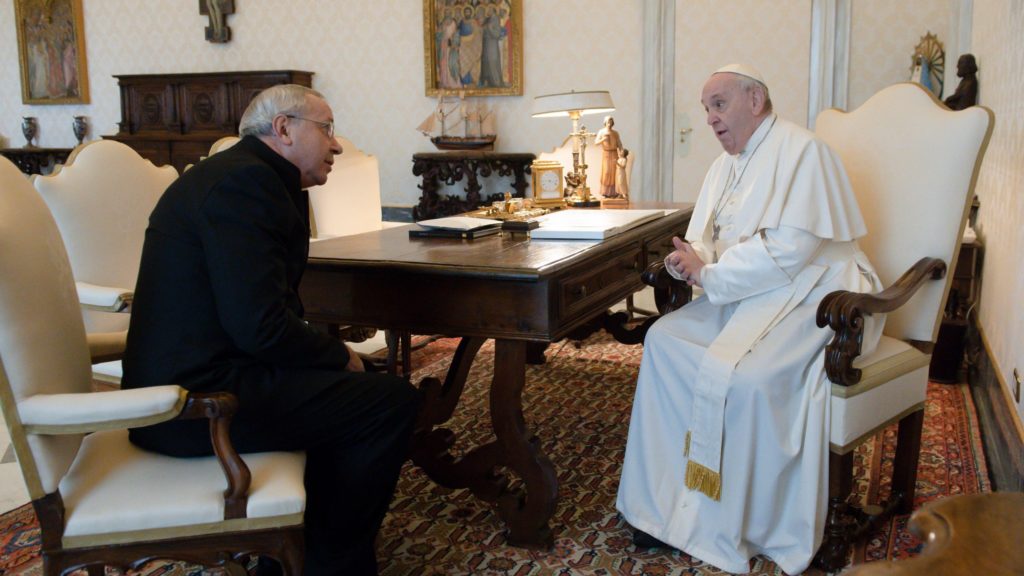After a months-long inquiry into allegations of sexual misconduct, Pope Francis’s Jesuit order has expelled a prominent member and famed artist on grounds that he violated his vow of obedience in regard to restrictions against him.
In a statement published Thursday, Father Johan Verschueren, who, in his role as permanent delegate of the Society of Jesus for houses, works and inter-provincial Jesuits in Rome, is handling the Rupnik case, announced “with a grieving heart that on June 9, 2023, the Father General dismissed Father Marko Ivan Rupnik from the Society of Jesus.”
“This was done in accordance with canon law, due to his stubborn refusal to observe the vow of obedience,” Verschueren said.
A famed Catholic artist and muralist whose works ordain chapels and shrines around the world, including the Vatican and the famous Marian shrine in Lourdes, France, Father Marko Ivan Rupnik, 68, has been under investigation and had been barred from public ministry after allegations of sexual misconduct with nuns surfaced last year.
Verschueren in Thursday’s statement said the Jesuit team investigating complaints against Rupnik submitted their dossier in February, documenting “numerous complaints of all kinds that have reached us, coming from very different sources and for events that occurred over a period of time of more than 30 years.”
“As superiors, we considered the degree of credibility of what was reported or witnessed to be very high,” Verschueren said, saying they complied with the investigating team’s recommendations and suggestions.
In this spirit, he said that Rupnik was ordered to change communities, moving from the Jesuit house attached to the Centro Aletti that Rupnik founded in Rome, and to “accept a new mission in which we offered him one last chance as a Jesuit to come to terms with his past and to give a clear sign to the many injured people who testified against him, in order to enter a path of truth.”
“In the face of Marko Rupnik’s refusal to obey this mandate, unfortunately we were left with only one solution: Dismissal from the Society of Jesus,” Verschueren said, adding that Rupnik received the decree of dismissal June 14, and has 30 days to appeal.
News of Rupnik’s dismissal comes in the wake of recent reports that he had made a trip to Bosnia and Croatia, where he engaged in art restoration projects despite the restrictions against him, which barred him from leaving the Lazio region and from engaging in public artistic activities.
Rupnik’s case has captivated the Catholic world in recent months due to his prominent standing as one of the most acclaimed contemporary Catholic artists, as well as the fact that he belongs to the same order as Pope Francis and a slew of other high-ranking Vatican officials.
His case made headlines last December when Italian blogs and websites reported that for years, consecrated women had accused him of spiritual and psychological abuse and sexual misconduct. The women belonged to the “Skupnosti Loyola” or Loyola Community, a religious order in Rupnik’s native Slovenia, and their allegations dated back to the 1990s, when Rupnik served there as a spiritual advisor.
After initial reports on the Rupnik allegations began to circulate last year, the Jesuit Order admitted that Rupnik had been briefly excommunicated in 2020 for having committed one of the church’s most serious crimes: using the confessional to absolve a woman with whom he’d had sexual relations.
Rupnik reportedly repented and the excommunication was quickly lifted a month later.
However, a year after that, Rupnik was accused by nine women of sexually, psychologically, and spiritually abusing them at the Loyola Community, which he co-founded, in the 1990s.
At the time, the Jesuits recommended that a canonical trial be opened, however the Vatican’s Dicastery for the Doctrine of the Faith (DDF), led by Spanish Jesuit Luis Ladaria, denied the request, refusing to lift the statute of limitations, which it has done in other cases, thus declaring the offenses unable to be prosecuted.
Details on the Rupnik case have remained obscure, and many observers question whether he was perhaps protected by the Vatican, where a Jesuit pope reigns and another Jesuit, Ladaria, leads the office where abuse allegations are tried.
As the scandal unfolded last fall, the Jesuits barred Rupnik from public ministry, from making any public comments, and from leaving the Lazio region where Rome is situated.
They invited anyone with other claims to come forward, and as a result, the Jesuits revealed in February that roughly 15 new complaints against Rupnik were made.
Though Verschueren at the time said there was not enough to send Rupnik’s case to civil courts, the Jesuit Order would continue pursuing its own inquiry in which various punitive measures, including defrocking, were on the table.
Verschueren in Thursday’s statement did not offer any details about what comes next, or whether Rupnik might still face expulsion from the priesthood, but said that while waiting for Rupnik to appeal, “we must limit ourselves to this official communication to allow the procedures to have their course.”
“If and only when the dismissal of Father Marko Rupnik from the Society becomes definitive, it will be possible to deepen the themes. Not before,” he said.

